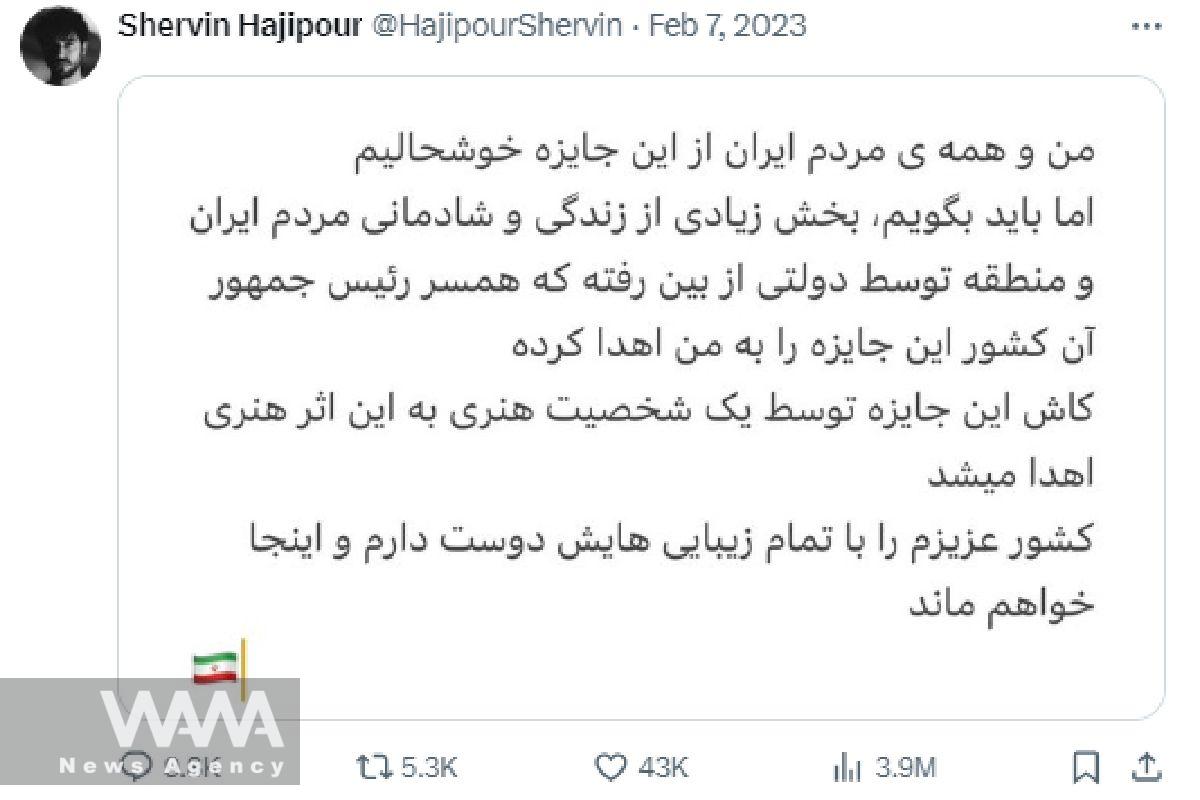Has Shervin Hajipour Joined the List of Expired Artists?
WANA (Sep 25) – On Monday, September 23, Shervin Hajipour announced on his Instagram page that the leader of Iran has granted him amnesty and that the judiciary has closed his case. Not many days passing from the amnesty news, Shervin Hajipour, who became popular among opponents of the Islamic Republic of Iran for singing the song “Baraye” in Mahsa Amini’s incident, is now facing a new wave of feedback from social media audiences.
Following Mahsa Amini’s death and the subsequent unrest in the fall of 2022, the Grammy Academy named Shervin Hajipour the Best Song for Social Change award for 2023. Jill Biden, the First Lady of the United States and wife of the sitting President, personally announced Shervin Hajipour as the award winner during the ceremony and praised the activists involved in the unrest in Iran.
However, after Shervin’s Instagram post with the caption “We won,” users on social media criticized him, reminding him that the country awarding him the prize has been responsible for the most crimes against humanity, particularly in Iran. These reactions prompted Hajipour to change his stance later.
He posted an image on Twitter stating, “All the people of Iran and I are happy about this award, but I must say that a significant part of the lives and happiness of the people of Iran and the region has been destroyed by a government whose First Lady awarded me this prize. I wish an artistic figure for this work of art had presented this award. I love my beloved country’s beauty and will stay here.”

After some time, Hajipour announced through his Instagram page that he had been sentenced to eight months in prison for “propaganda against the Islamic Republic of Iran” and to three years in prison for “inciting the public to unrest with the intent to disrupt the security of the country.”
After receiving this sentence, Shervin appealed to the court to overturn his prison sentence. Following these actions, his travel ban was lifted, but the three-year and eight-month prison sentences remained in effect.
However, Asghar Jahangir, Iran’s judiciary spokesman, stated in response to Hajipour’s post that “according to the Supreme Court’s review, no request for retrial has been filed by Shervin Hajipour or his lawyers. If he regrets it and wants to act through retrial or the powers of the head of the judiciary, this opportunity exists. If no request is made, the sentence will be executed.”
Hajipour again posted a video on his Instagram claiming that the cancellation of his prison sentences in the appeals court had been futile and that he had been summoned to serve his sentence. However, about a month after this post, he released a new video announcing that he had received clemency from the leader and that his prison sentence had been revoked, resulting in the closure of his case.
Following the announcement of Shervin Hajipour’s clemency, anti-government users attacked the singer on social media. These individuals, who had expected Hajipour to be imprisoned or even sentenced to death, were taken aback by Iran’s leader’s clemency ruling and distanced the singer from the ranks of the protesters. Those who once portrayed Shervin Hajipour as a hero for their benefit now referred to him as a government agent in response to his compassion.
The anti-government front, which intended to create a new wave of opposition against Iran with Hajipour’s imprisonment, also faced defeat. According to experts, the opposition’s reactions of both joy and disappointment are not new. Over the past two years, a review of the anti-government media’s positions shows that each public figure has a specific mission and expiration date!
Adel Ferdowsipour is among those who, after engaging with the rebellious students at Sharif University, received support from the opposition but was later rejected by this movement. Many other figures, including Tomaj Salehi, Armita Abasi, and Hossein Ronaghi, have experienced similar fates to those of Shervin Hajipour and Adel Ferdowsipour in the past two years.

Shervin Hajipour: From Melody to Political Challenge
WANA (Sep 23) – In 2022, the events surrounding the death of Mahsa Amini had a profound impact on Iran’s artistic community. Shervin Hajipour, a prominent and controversial Iranian artist, was sentenced to three years and eight months in prison due to his activities against the Islamic Republic and for allegedly inciting violence. […]












